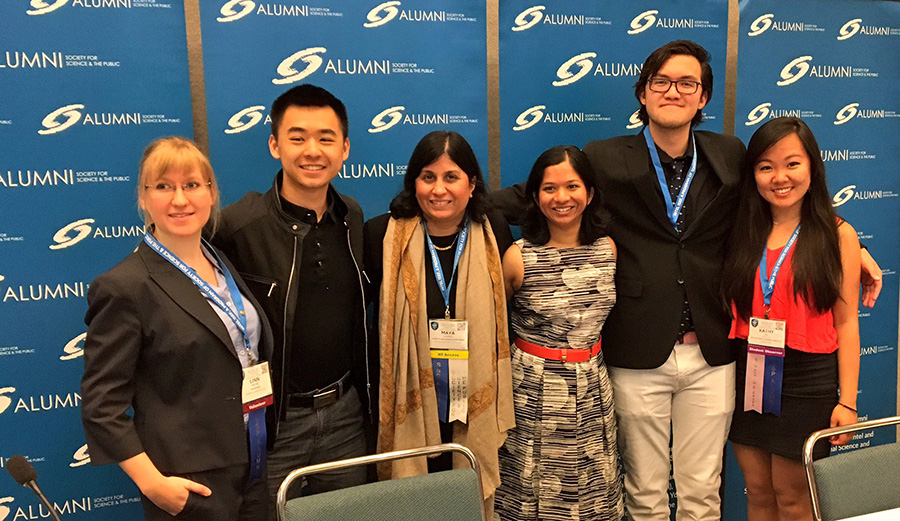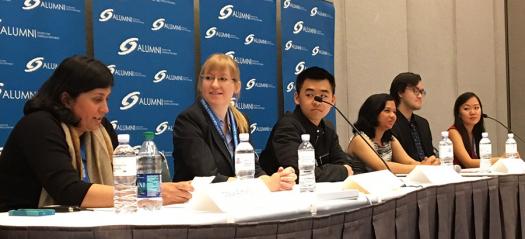Oh, the places you’ll go after Intel ISEF

If you’re interested in science and research, go for it and persist. This was the main theme of the Leveraging Your Science Fair Experience: Oh the Places You Can Go! symposia session at Intel ISEF 2017 with Society for Science & the Public President & CEO Maya Ajmera and several Intel ISEF alumni.
“Many of you will now become alumni after this week,” Maya said. “It comes with a great network and an extraordinary experience.”
Alumni on the panel included:
- Linn Bieske: Intel ISEF 2012
- Raymond Wang: Intel ISEF 2015
- Diya Dwarakanath: Intel ISEF 2008
- Christopher Lindsay: Intel ISEF 2014-2015
- Kathy Liu: Intel ISEF 2015-2016
Their advice to current Intel ISEF finalists varied.
Linn encouraged them to, above all, have fun. Others told them to go explore.
“Get over any shyness you might have with meeting people,” Christopher said. “You have a week here; it’s a long time to meet interesting people.”
Stay in touch with these people you meet on social media, Diya suggested. You never know where these connections will end up. Diya had the chance to attend a research conference in school and “felt comfortable because it felt like Intel ISEF all over again.”
This week is not necessarily an end goal, Kathy reminded the finalists. “Intel ISEF opens doors for you,” she said. “Use this as outreach to help other people get here.”

Maya then wanted to know how they manage challenges and disappointments in STEM.
“Take disappointment as a motivation,” Linn said. “You’re already here, you’ve already achieved great things.” She encouraged finalists to ask questions or for help, get an external perspective. “If you don’t have any challenges in your research project, you would just get bored,” she said.
“Stay calm and persist,” Raymond echoed. It’s easy to get frustrated if a simulation doesn’t work, but instead of panicking figure out who you can turn to for help, whether it’s a mentor or a paper.
For Christopher, the most challenging thing is getting started. He suggested just doing it, because the sooner you start, the easier it will be in the long run.
He also said that disappointments should be met with self-reflection instead of self-hatred. “A lot of times, things that go wrong are out of your control,” he said. For example, he was researching deep pressure ocean cameras and when he did an experiment, the camera imploded. He made another and tried again.
Disappointments should be met with self-reflection instead of self-hatred. A lot of times, things that go wrong are out of your control. —Christopher
Diya encouraged the finalists to keep their eyes on the higher goal. “In research, so many times we’re working on a tiny aspect on one thing,” she said. But her overall goal was to help with Alzheimer’s. Research can become tedious, but “remember why you’re doing this and your purpose.”
Find what works for you, Kathy said, “whether that’s blasting Kanye or sitting on the top of a mountain.”
The alumni said their family, friends, professors, fair directors, mentors, and dogs help support them.
When asked how they would improve the science fair process, the alumni suggested:
- A buddy program where finalists from different countries are paired up.
- A maker-faire for competitors to build something together.
- More space to interact with judges and learn from their careers.
- A way to raise awareness and make science fairs more popular and accessible.
- A way to help every high school have a science fair.
Take disappointment as a motivation. If you don’t have any challenges in your research project, you would just get bored.
— Linn Bieske

Maya was curious to know what is next for the recent alumni.
Linn is finishing a master’s program in materials science. Afterwards, she plans to study business in London.
Diya just received her master’s in biomedical engineering. She is job hunting and hopes to work on implantable medical devices like insulin pumps or pacemakers.
“I don’t think there’s only one path,” Diya said. She might stay in research and development or go to strategy development. “Hopefully in 20 years, I will be helping to save the world.”
Kathy is interning at a battery startup, which is similar to her Intel ISEF research.
Raymond and Christopher don’t know exactly what is next in their futures.
“I’m not sure I want to specialize in STEM,” Raymond said. “I’m looking at business.” This summer, he will be doing business strategy work for Delta airlines, which also relates to his Intel ISEF project, which looked at improving aircraft cabin airflow. But the common theme he has is to try and make an impact. “I always want to be involved in innovating,” he said.
College is a good place to figure things out, according to Christopher. “It’s okay not to know exactly what you’re going to do for the rest of your life,” he said.
Currently, he’s double majoring in environmental studies and astronomy. He’s from Hawaii, and wants to return to study or work there.
These recent alumni aren’t only talented scientists and researchers, they also believe in STEAM, the interaction and inclusion of science and art. Linn was a professional skier who also does hip hop and breakdancing. Kathy debates, which she said helps with communication. Diya is a classical dancer and writer. Raymond tries out new instruments for fun. Christopher, too, is involved with music. In college, he was deciding between science or pipe organ performance. “Hitting things relives stress,” he said.
“Science is about being open and exploring,” Kathy said.
Science is about being open and exploring. —Kathy
These five recent alumni all returned to volunteer at this year’s Intel ISEF for various reasons.
It was obvious to Christopher that he volunteer. He lives in L.A., for one, and it’s fun. “It helped me understand that amount of work that goes into this program, and how much effort these people put into science education,” he said.
The finalists are Linn’s motivation to volunteer. “Your projects are great, you’re going to shape the future,” she said.
Intel ISEF is life-changing, Raymond said. “These huge gatherings of so many brilliant people don’t happen overnight — the very least I could do is give back,” he said. “I want to give that experience to finalists, moving forward.” He and Kathy agreed that “there’s nothing else in the world quite like Intel ISEF.”
“It’s important for me to give back for all I’ve received,” Diya said. “As long as Intel ISEF exists, I want to be a part of it.”


